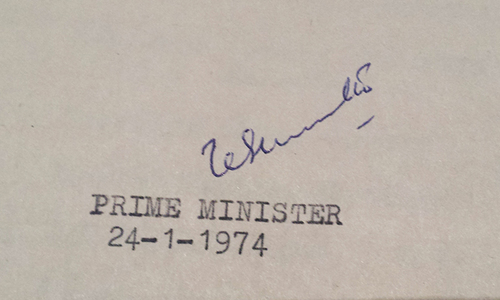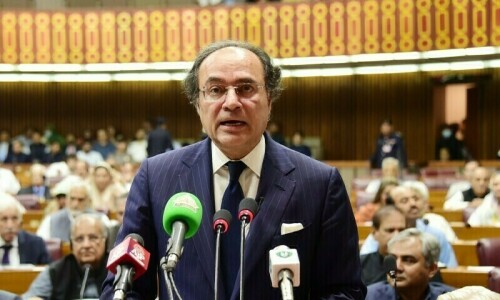
ON Saturday, 14th of March 2020, death finally silenced senior politician Dr Mubashir Hasan, one of Pakistan’s most indefatigable campaigners for the people’s empowerment and a great crusader for peace and understanding between Pakistan and India. He was 98. He had been bedridden for many weeks. He was suffering from acute chest infection and asthma and had become extremely weak as a result of his inability and refusal to take any food.
Born on Jan 21, 1922 in a well-to-do family in Panipat, Dr Mubashir Hasan received his early education in Panipat and Lahore under the umbrella of elder brother, Dr Shubbar Hasan. While Shubbar studied medicine. Mubashir opted for engineering. He graduated from Lahore’s Engineering College and did his MSc in civil engineering from Columbia University and PhD from the University of Iowa
Dr Mubashir’s earliest jobs included a stint with the irrigation department in Punjab. He taught for many years at the University of Engineering and Technology, Lahore, till his career as a teacher was abruptly ended by the Ayub Khan regime. Although he did some consultancy work, Dr Mubashir soon developed interest in working for the marginalised, especially those dwelling in katchi abadis, whose plight he had discovered along with his friend, Raza Kazim. Soon he was able to gather around him a number of young men, with radical ideas and a few women, led by his wife, Dr Zeenat Hasan. Many from among this group later became prominent in politics.
His friends and admirers, who used to join him at regular meetings at his house, were quite surprised when he suddenly left for Larkana and returned after assuming duties as Zulfikar Ali Bhutto’s deputy in the party ZAB had decided to launch following his break-up with Ayub Khan.
The Pakistan Peoples Party was formed at a two-day convention at Dr Mubashir Hasan’s house in 1967 and in the 1970 general election Dr Mubashir Hasan won a seat in the National Assembly from Lahore’s working class constituency and was the finance minister in the first Bhutto government. It was under his guidance that large-scale industrial units were nationalised. It did not take him long to realise that power was held tightly by the establishment, led by the civil and military bureaucracy, a theme he developed in his book The Mirage of Power. He didn’t hold the ministerial office for long and enjoyed the life of a private citizen in Lahore until he was asked to accept the post of PPP’s general secretary.
When Bhutto was challenged by the Pakistan National Alliance after the election of 1977 Dr Mubashir Hasan publicly advised him to mobilise the peasantry and the working class in his fight against the right wing parties who had outfitted themselves in religious robes. The advice was declined.
The fall and execution of Mr Bhutto convinced Dr Mubashir Hasan that establishment of democracy in Pakistan was not possible without mobilising the people in a strong political party in which activists at the base level held power. He tried to offer his counsel to Benazir Bhutto when she returned from self-exile but was discouraged and he adopted the role of an unencumbered statesman, a public intellectual, until he joined the Shaheed Bhutto faction of the PPP led by Ghinwa Bhutto many years later. In 1993 he and Asma Jahangir called for an activist-based political party but the idea fell through.
Dr Mubashir Hasan was one of the founding members of the Human Rights Commission of Pakistan and served as member of its governing body till old age forced him to curtail his activities.
Around the same time Dr Mubashir Hasan went through a remarkable transformation. From a hardline nationalist he developed into a campaigner for peace in the world and peace in the subcontinent. The former cause laid the basis of Dr Mubashir’s friendship with Dr Bernard Lowne, the founder leader of Nobel Prize winning organisation, Physicians for Peace.
The latter cause led him into a South Asian group that worked for regional peace in the early 1990s. But it was in 1994 that Dr Mubashir’s most fruitful contribution to India-Pakistan peace began when he helped and guided a large group of activists from the two countries into the founding of Pakistan-India People’s Forum for Peace and Democracy, the well-known peace outfit. The respect he enjoyed on both sides of the India-Pakistan border enabled him to engage the leaders of both countries and bring them round to the ideas of understanding until the whirlwind of religious reaction made peace a dirty word.
A keen photographer and nature lover who had to his credit the book Birds of Pakistan, the causes Dr Mubashir Hasan pursued were varied. His final contribution to Pakistan’s politics was the production under his leadership of a new social charter which envisages a restructuring of the state as the existing system has become much too rotten to serve a modern society or to be reconditioned into a properly functioning arrangement. The model suggested is based on full and genuine transfer of power to the people from the bottom layer to the top.
The only hope for Pakistan he saw was in the awakening of people and assertion of their sovereign rights. Even during the last days of his life, when he could barely speak, he would ask his friends, “When will the people rise to shake off this oppressive system”.
Dr Mubashir Hasan is survived by his wife, Dr Zeenat Hasan and a large number of friends, admirers and disciples.
Published in Dawn, March 15th, 2020















































Dear visitor, the comments section is undergoing an overhaul and will return soon.